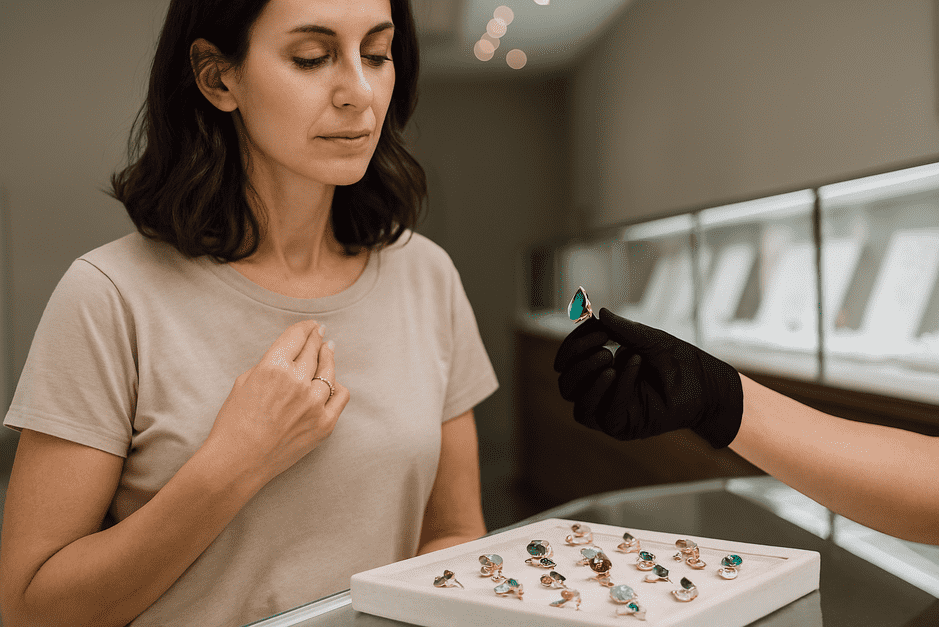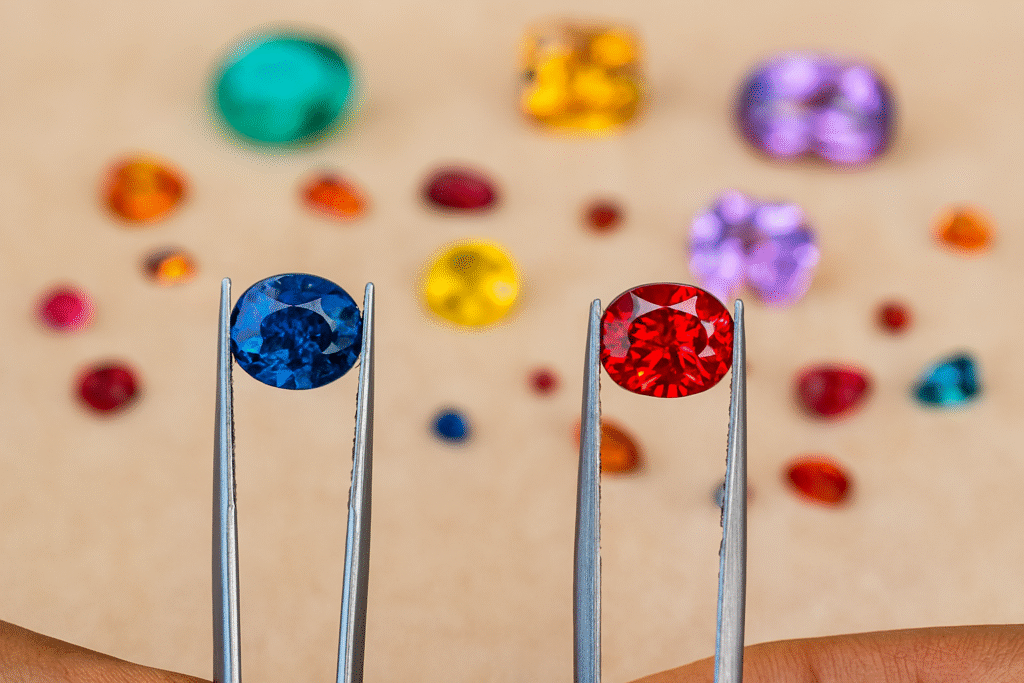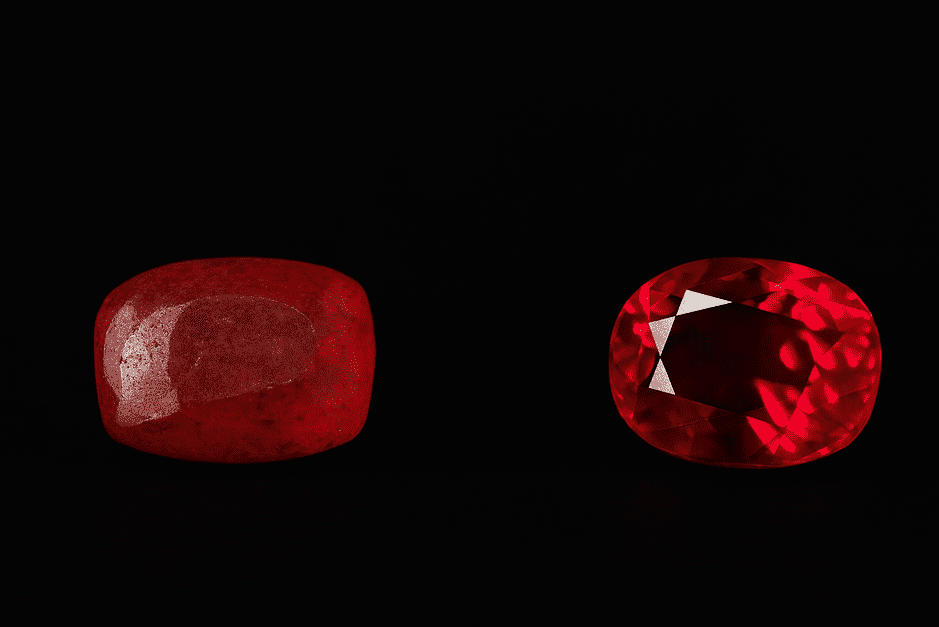Choosing a gemstone isn’t just about rarity or flawless clarity. You need the perfect gemstone for you—one that fits your style, skin tone, and lifestyle.
The key is prioritizing your personal needs over market trends.
A stone may appear flawless on paper. Yet if the color clashes with your skin tone, or the size is impractical, it becomes an accessory you’ll rarely wear. In fact, research shows nearly 60% of buyers regret gemstone purchases because they overlooked personal style or comfort. For deeper insights, see the guide on Gemstones by Color and Skin Tone.
Why the “Perfect” Stone Often Fails
- Skin Tone Mismatch: 62% of buyers select stones that look good in the store but clash with their natural skin tone. As a result, many never wear them. Learn how to avoid this mistake in Gemstone Shopping Tips.
- Lifestyle Conflicts: Large stones can be uncomfortable for daily wear. Therefore, 41% of buyers report avoiding rings they purchased due to discomfort.
- Market Trends vs Personal Taste: Rare or trending stones may look appealing. Yet, your comfort should come first, as explained in the post on Lifestyle Jewelry Choices.
Tips to Choose the Right Gemstone
- Test stones in natural light to check true color.
- Consider durability for everyday wear. For example, check ratings from the GIA Gemological Institute.
- Match size to lifestyle. Rings between 1–3 carats balance elegance and comfort. See examples in Gemstone Durability Ratings Guide.
- Factor in resale value, but above all, prioritize personal enjoyment.
- Try multiple stones before purchase. After all, handling stones yourself often reveals comfort, weight, and visual appeal.
Quote: “A gemstone is only perfect if it feels right for you.”
Q&A: Buying the Perfect Gemstone
Q: Should I buy a gemstone just because it’s rare?
A: Rare stones are tempting. Yet rarity doesn’t guarantee suitability. Therefore, choose a stone that complements your lifestyle.
Q: How do I match gemstones to my skin tone?
A: Warm skin tones suit yellow, orange, and red stones. Meanwhile, cool skin tones pair with blues, greens, and purples.
Q: How do I choose a practical size?
A: Rings between 1–3 carats are most comfortable for daily wear. For instance, many clients report higher satisfaction within this range.
Case Study:
A client chose a flawless 5-carat sapphire. However, she reported daily discomfort and eventually sold it. A 2.5-carat stone would have suited her lifestyle better. As a result, practicality proved more important than rarity.
Learn more:
. Gemological Institute of America: Gemstone grading and care
. American Gem Society: Gem buying guides and ethical sourcing
This comprehensive gemology FAQ covers everything about studies, specializations, careers, and tools in the field. Whether you’re considering gemology education or exploring career opportunities, this guide answers the most frequently asked questions about becoming a professional gemologist.
1. What is Gemology?
Gemology is comprehensively defined as the scientific study of gemstones. This fascinating field encompasses their intricate identification, precise grading, geographical origins, various treatments, and ultimate valuation. Through dedicated study, individuals learn to meticulously differentiate between natural, synthetic, and imitation stones.
2. Why Should You Study Gemology?
Studying gemology offers a wealth of professional advantages. Crucially, you will acquire essential skills applicable across diverse sectors such as jewelry retail, prestigious auction houses, and specialized laboratories. Furthermore, this expertise empowers you to advise clients with unparalleled authority, thereby fostering trust. Ultimately, a strong gemological foundation serves as a vital safeguard against potential fraud, protecting both yourself and your clientele.
3. Main Areas of Specialization in Gemology
The field of gemology branches into several distinct and vital specializations, allowing for focused expertise.
Diamond Grading
One prominent area is diamond grading, where the focus meticulously centers on the renowned 4Cs: cut, color, clarity, and carat weight. Here, students become adept at understanding the rigorous grading systems employed by leading laboratories, such as the Gemological Institute of America (GIA).
Colored Gemstones
Another significant specialization involves colored gemstones. This area demands extensive study of iconic gems like rubies, sapphires, and emeralds, alongside hundreds of other vibrant stones. Critically, understanding how geographical origins profoundly influence a gem’s ultimate value is a core component.
Pearls
The study of pearls constitutes another specialized path. Students learn to distinguish between natural, cultured, freshwater, and saltwater pearls, each with unique characteristics. Consequently, comprehending how nacre quality directly impacts a pearl’s market price becomes paramount.
Gem Treatments
Detecting gem treatments is a highly technical specialization. This involves identifying various enhancements such as heat, irradiation, oiling, and fracture filling. Moreover, recognizing how these treatments significantly impact a gem’s market value is a crucial skill for any gemologist.
Synthetic and Lab-Grown Stones
The specialization in synthetic and lab-grown stones focuses on differentiating these from their natural counterparts. Therefore, learning to spot subtle indicators like specific growth patterns or distinctive inclusions is essential for accurate identification.
Gem Trade and Valuation
Finally, gem trade and valuation represent a specialization focused on the commercial aspects. Here, students delve into pricing strategies relevant to both local and global markets. Additionally, studying how demand fluctuates over time provides critical insights into market dynamics.
4. Courses and Qualifications That Matter
Pursuing formal education is key to a successful gemological career, with several qualifications holding significant weight.
Global Diplomas
Globally recognized diplomas are particularly impactful. The GIA Graduate Gemologist (GG) certification is highly esteemed, as is the FGA (Fellow of the Gemmological Association of Great Britain).
Advanced Lab Certifications
For those aiming for high-level laboratory work, advanced certifications from institutions like SSEF, Gübelin, and HRD are invaluable. These courses provide specialized, in-depth knowledge crucial for cutting-edge analysis.
Local Courses
While local courses can be helpful for beginners to gain foundational knowledge, it is generally understood that global diplomas carry considerably more professional weight and recognition within the industry.
5. Duration of Gemological Studies
The commitment required for gemological studies varies significantly depending on the chosen program. Short courses, for instance, might only last a few weeks, offering a quick introduction. Conversely, comprehensive diploma programs typically extend from six months to two years, providing in-depth training. Specific modules, such as those focused solely on diamond or pearl grading, can often be completed within a matter of weeks, allowing for targeted skill development.
6. Tools You Will Learn to Use
Mastering specialized tools is fundamental to effective gemological practice. Among these, the microscope is indispensable for meticulously examining inclusions, which act as fingerprints of a gem’s formation. Similarly, a refractometer accurately measures the refractive index, a key optical property aiding identification. A polariscope helps determine a gem’s optic character, revealing its internal crystal structure. Furthermore, a spectroscope is used to analyze absorption patterns within a gem, providing clues about its chemical composition and potential treatments. Lastly, an ultraviolet lamp is crucial for observing fluorescence, another diagnostic characteristic.
7. Career Options After Gemology
A qualification in gemology opens doors to a diverse range of career paths. Many graduates find fulfilling roles as jewelry retail professionals, guiding customers with expert knowledge. Others excel as diamond or gemstone graders in renowned laboratories. Opportunities also exist as auction house cataloguers, meticulously documenting precious items. Moreover, becoming a wholesale gemstone buyer requires keen market insight and negotiation skills. For those seeking independence, working as an independent appraiser is a viable option. Finally, a career as a laboratory researcher appeals to those interested in advancing gemological science.
8. Is Gemology Only About Science?
No, gemology is far more than a purely scientific discipline; instead, it artfully blends rigorous science with practical trade knowledge. Consider this example: a sapphire may exhibit the correct inclusions indicating natural origin, but its ultimate price often depends heavily on its specific origin and market perception. Therefore, deep scientific knowledge and sharp market awareness must effectively work together for success in this field.
9. Career Growth Paths in Gemology
The field of gemology offers numerous avenues for significant career growth. Professionals often begin their journey as a retail associate or a junior grader, building foundational experience. From there, progression into more specialized roles in wholesale, laboratories, or prestigious auction houses is common. As expertise develops, individuals can establish a strong reputation as an independent appraiser or a consultant. Furthermore, opportunities may arise to move into teaching, sharing knowledge with aspiring gemologists, or into writing, contributing to the industry’s body of literature.
10. Gemology for Jewelry Business Owners
For jewelry business owners, a background in gemology is an invaluable asset. Firstly, it helps to proactively avoid costly mistakes during sourcing and purchasing. Secondly, possessing this expert knowledge builds immense trust with customers, allowing for clear and confident explanations about products. Lastly, it instills greater confidence when sourcing directly from miners or dealers, ensuring informed decisions and better acquisitions.
11. Choosing Your Specialization
When considering a specialization in gemology, a critical self-reflection is to ask: Do you intrinsically prefer diamonds, colored stones, or pearls? Notably, a focus on diamonds frequently leads to roles in retail and esteemed certification laboratories. Conversely, specializing in colored stones often necessitates strong field knowledge, recognizing the nuances of diverse origins and treatments. Meanwhile, a passion for pearls typically connects with careers in luxury retail and high-end auctions, where discerning clientele appreciate their unique beauty.
12. Skills You Need Beyond Gemology
Beyond the core gemological knowledge, several complementary skills are indispensable for professional success. Possessing sharp observation is critical for discerning subtle details in gemstones. Developing clear client communication skills is paramount for effectively explaining complex concepts to customers. Furthermore, robust market analysis abilities are essential for understanding trends and pricing. Lastly, strong negotiation skills are invaluable, particularly in the dynamic processes of buying and selling gemstones.



